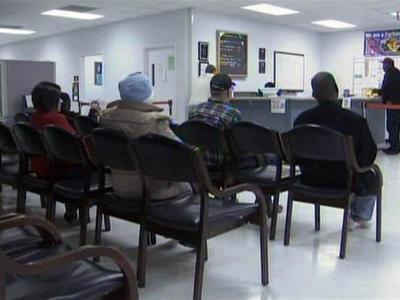LONDON – The British economy shrank 0.4 percent in the third quarter, surprising forecasters and dashing hopes the country would follow France and Germany out of recession.
The disappointing figure leaves Britain in the grip of the worst downturn since official records began in 1955 and piles pressure on Prime Minister Gordon Brown's government ahead of next year's general election.
Economists had expected Thursday's update from the Office for National Statistics to be a close call between growth and contraction. But most had plumped for slight growth — and few had forecast a drop large enough to take the total fall in output since the start of the recession to 5.9 percent.
The persistent decline comes despite concerted attempts by the government and Bank of England to boost the economy, including holding interest rates at a record low of 0.5 percent since March, an unprecedented 175 billion pound ($290 billion) injection into the money supply and billions more through fiscal measures.
The main opposition Conservative Party, already significantly ahead in the polls ahead of an election that must be held by the start of June, was quick to use the figures to denounce Brown's economic record.
"Britain is still in recession six months after France and Germany came out of recession," said lawmakerGeorge Osborne, the party's Treasury spokesman. "We need urgent new economic leadership in this country."
Treasury chief Alistair Darling defended the government's position, saying he had warned that the recession was always going to be "deeper and more profound than many people thought." He said there were signs of improvement — the latest data notwithstanding.
"I've always said that it will take time to come through it, now our job is to support the economy as we come through toward recovery and whilst I've always said I didn't expect to see growth until the turn of the year, it will come. I'm confident about that," Darling said.
But economists said the surprisingly weak third quarter figures, marking the sixth consecutive quarterly contraction, left little room for optimism.
"The ... data are a real shocker and desperately disappointing," said IHS Global Insight economist Howard Archer. "It is impossible even to take comfort from the fact that the rate of contraction moderated, especially as the Eurozone and the U.S. seem highly likely to have grown in the third quarter."
Britain was hit particularly hard by the global credit crunch because of its huge financial sector, where the government was forced to carry out a multibillion pound bailout of major banks, and higher levels of personal debt among consumers. Like the US, it also faces a collapsed real estate bubble.
In contrast, Germany and France avoided credit-fueled housing booms. They were also less dependent to begin with on banking and did not need to intervene to such an extent in the sector.
The two European countries have also benefited from so-called automatic stabilisers, including more generoussocial welfare systems that kick in during recessions and help support consumer spending.
As a major exporter, Germany has benefitted from the recovery in the global economy, which has in turn led to a pick up in domestic demand.
Both Bank of England governor Mervyn King and Treasury Chief Alistair Darling have said they expect some modest growth in Britain by the end of this year.
But some economists have warned of a so-called "double dip," or "W-shaped" recession as pressures intensify in 2010 as some stimulus measures, like a temporary cut in sales tax, come to an end. Unemployment is also rising.
"The fact that the economy is still contracting despite the huge amount of policy stimulus supports our view that the recovery will be a long, slow process," said Vicky Redwood, an economist at Capital Economics.
Like many other forecasters, Capital Economics believes that Britain will struggle to reach growth in gross domestic product, which measures the total amount of goods and services produced by a country, of 1 percent next year.
The pound plunged more than 2 U.S. cents to $1.6339 as markets factored in the likelihood that the central bank will have to increase the so-called quantitative easing program — buying assets from banks to boost themoney supply — when it meets next month. Interest rates are already forecast to stay low well into next year. Both measures can weigh on a country's currency.
Derek Simpson, the general secretary of Unite, Britain's largest union, said the figures showed that Britain was "still paying the price for the greed and recklessness of bank bosses."
"These figures show exactly why there can not be a return to the bonus culture that wrecked our economy and put thousands of ordinary finance and manufacturing workers out of work," he added.
The third-quarter figures showed the pressure on hard-hit consumers, with output from retail, wholesale, hotels and restaurants falling 1 percent over the quarter.
Services, which represents almost three-quarters of the domestic economy, was expected to register growth after recent gains. Instead it disappointed with a 0.2 percent decline. Industrial production shrank by 0.7 percent and is down by 13.7 percent since the recession began.
Friday's figures were compiled with around 40 percent of the required data and could change in the next two months when more information has been gathered — the office's first GDP estimate for the previous April to June quarter was a contraction of 0.8 percent, which was later revised to a 0.6 percent drop.



Tidak ada komentar:
Posting Komentar